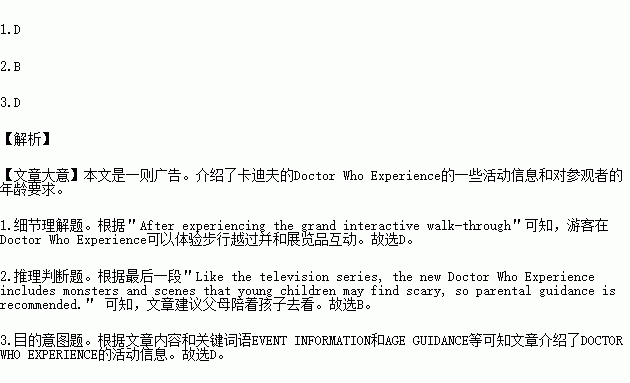题目内容
DOCTOR WHO EXPERIENCE
LOCATION: Cardiff Bay, Cardiff
EVENT INFORMATION:
Situated within touching distance from where the iconic(偶像的)BBC series is filmed, the Doctor Who Experience in Cardiff features a grand interactive adventure where visitors become an official companion and come face to face with some of the scariest monsters seen on screen, as well as having the chance to fly the legendary(传说的)TARDIS for the Doctor.
After experiencing the grand interactive walk-through, fully immerse yourself in props(道具)from the television series within the exhibition area — see up and close the incredible sets, costumes and props that feature in your favourite show including the entire collection of Doctors’ iconic costumes from 1963 to the present day.
Packed with amazing special effects, this multi-sensory experience is fun for the family and fans alike.
AGE GUIDANCE:
No minimum age restriction, but is advised as 5+.
Children to be accompanied by an adult.
Under 5’s are free.
This is not a 3D attraction but does include 3D effects. Strobe (闪光灯) lighting effects, floor movement and scenes which younger children may be scared within the walk through areas, please speak to a member of staff on arrival if you have any concerns.
Like the television series, the new Doctor Who Experience includes monsters and scenes that young children may find scary, so parental guidance is recommended.
1.What can visitors do in the new Doctor Who Experience?
A.Come face to face with some real monsters.
B.Talk with the legendary TARDIS for the Doctor.
C.See the collection of Doctors’ iconic costumes in 1963.
D. Going through the grand interactive walk-through.
2.What are parents recommended to do?
A. Prevent children from going.
B. Keep company with children.
C. Take photos of the exhibition.
D. Let children go there alone.
3.What is the purpose of the passage?
A. To tell people the history of Doctor Who Experience.
B. To show us how attractive Doctor Who Experience is.
C. To tell people when and where Doctor Who Experience is held.
D. To inform people some information about Doctor Who Experience.

